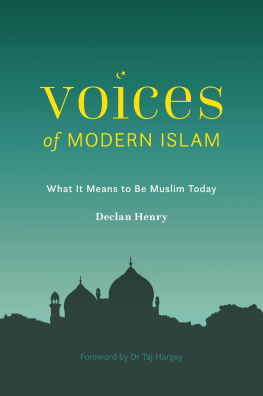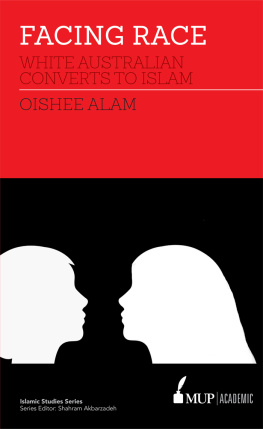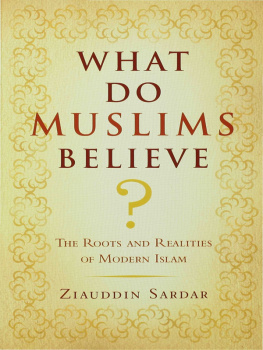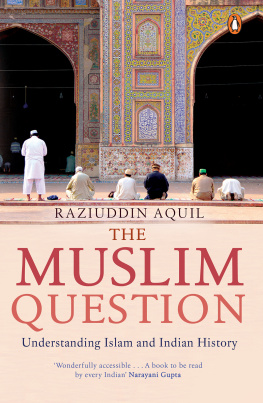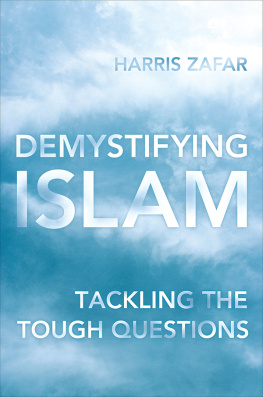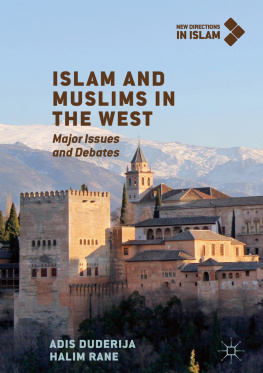

What It Means to Be Muslim Today
Declan Henry
Foreword by Dr Taj Hargey

Jessica Kingsley Publishers
London and Philadelphia
CONTENTS
Foreword
Dr Taj Hargey
Director, Muslim Educational Centre of Oxford
Imam, Oxford Islamic Congregation
Islam in our time is by far the most controversial and contentious of all global faiths. From its ancient origins in the remote tribal deserts of Arabia to its rapidly booming presence everywhere in the modern West and elsewhere, the religion of Muhammad is often identified with lethal intolerance, indiscriminate violence, primitive customs, belligerent homophobia, blatant sexism, amongst other execrable assertions. While most Muslims in both the Islamic heartlands as well as in the Western diaspora tend either to just ignore or to explain away these shocking and inconvenient manifestations of their creed, this self-defeating policy only confirms these disturbing allegations in the minds of many outside observers. When Muslims engage in such conscious obfuscation, they do Islam and themselves no favours as it hardens Western hostility to the (relatively) new Muslim immigrants in Europe and North America.
Instead of simply dismissing the justified criticisms levelled against Islam and its followers, it is imperative that both Muslims and non-Muslims be adequately informed about the practical dimensions of the Prophets religion as practiced in British society today. For this reason alone, Declan Henry who has demonstrated an admirable comprehension of Islam far in excess than most observant Muslims has written a highly evocative and extremely pertinent volume by bravely tackling the perennial questions and pressing dilemmas facing contemporary British Muslims. By permitting a broad cross section of ordinary believers as well as professional practitioners of the faith from different sects and various denominations to articulate their own perspectives as well as their inherited sentiments about Islam, this timely book is an invaluable resource in generating an enlightening and positive public debate surrounding Islam as well as a better understanding of this hugely variegated and proliferating religion within the United Kingdom.
However, to comprehend what Islam is really about, it is vital to differentiate between what is primary and what is populist belief. The two are not the same. It is as glaring as night and day. In other words, everyone should distinguish what Muslims believe and what Islam believes, and not infer that that ones own personal credo is reflective of pristine Islam. Critics maintain that those who adhere to Islams original scripture alone (Quran 6:114, 68:3637) can be termed Muslims, while those who heed the additional sources should be labelled as Muhammadans, as the latter focus more on Muhammad and habitually twists the Qurans original teachings. Indeed, there is a world of difference between what is Quranic Islam (derived solely from the faiths transcendent text) and what is popular Islam stemming mainly from the much later manufactured sources like the Hadith, Sharia and fatwas (the Prophets presumed sayings, medieval theological opinions and individual clerical rulings). This clear-cut dichotomy of what Islam promotes and what Muslims project runs throughout this highly readable book and is plainly evident in the incongruous testimonies of numerous Muslims right across Islams theological spectrum. From the utterances of the orthodox Sunni majority to the views of the traditional Shia minority, from the opinions of the heterodox Ahmadi sect to the radical interpretations of Sufi mystics and Salafi zealots, the author has succeeded in weaving together a truly fascinating and compelling portrait of Muslims in Britain today.
When the multiple and often conflicting viewpoints of British Muslims are analysed and placed side-by-side, it confirms that there is no hegemonic theology within contemporary Islam in the United Kingdom. For the average non-Muslim reader, the puzzling doctrinal differences within the Muslim community are stupefying, bewildering and alarming. Most Muslim respondents in this book, contrary to what the Quran teaches (2:177), fixate upon a ritualistic if not robotic application of their faith that is principally predicated upon suspect non-scriptural dictates and ensuing ecclesiastical fabrications, both classical and contemporary. This largely unthinking and non-introspective belief system damages and does immense disservice to the innate intellectualism and rational foundation of Quranic Islam. If Muslims observe the original divine dictates of their faith, and not slavishly abide by the subsequent post-prophetic man-made dogmas that have contaminated both orthodox and heterodox Islam, then they would find themselves living in amity and concord in Western society. There is nothing in the faiths primary source (the Quran) that renders it incompatible with mainstream British values. But the reverse is incontrovertibly true. Should Muslims insist upon importing and implementing the Hadith, Sharia and fatwa variants of a populist Islam into the United Kingdom, they will invariably find themselves at odds with Britains established laws and social conventions that assure intellectual liberty, religious freedom, female equity, human rights, homosexual tolerance and a whole range of other topical prerogatives. Frankly, British Muslims either need to fit in or to ship out if they want to be considered as an integral and respected segment of UK society.
What this illuminating book reveals in remarkable detail is that many Muslims in the UK despite the fact that most have now been here for several generations seemingly regard tokenistic, outward and superficial moves towards mainstream society as somehow sufficient by itself to be regarded as valued citizens of Britain. These Muslims incline to gloss over the absence of any worthwhile adaptation to and prudent adoption of Britains vaunted jurisprudence and long-established customs that guarantees everyones equality, dignity and respect. Unless British Muslims cut the entrenched umbilical cord that binds them to their ancestral homelands, whether in South Asia, the Middle East or Africa, they will unfortunately retain a non-integrationist mentality by creating a separatist and isolationist community. They will, regrettably, not become full and effective stakeholders in this successful Western nation that welcomed all their migrant forebears who arrived as workers, students and refugees. By electing to remain aloof and apart from the majority non-Muslim population in voluntary self-contained enclaves up and down the country, this apartheid-like segregation exacerbates social tensions and communal divisions. It furnishes the ideal pretext for far-right groups like the English Defence League, Britain First and others to target Muslims for their visible in-your-face culture, cuisine, clothing and creed. While right-wing racists need to be debated and defeated through convincing proof and potent counter arguments, there is no denying that Muslims are also partly liable for the growing anti-Muslim xenophobia in this country. Quite evidently, escalating Islamophobia in the UK ever since the horrific London tube bombings in 2005 is the direct consequence of repeated Muslim terrorist outrages in Britain and other European countries. Staying separately, living apart by their own volition in separatist bubbles, speaking alone in native tongues, imbibing militant theology and mixing with only their own kind have all been spectacular own goals for British Muslims. Lamentably, it has exposed every law-abiding citizen within the Muslim community to mounting right-wing vindictiveness and violence.
Next page
